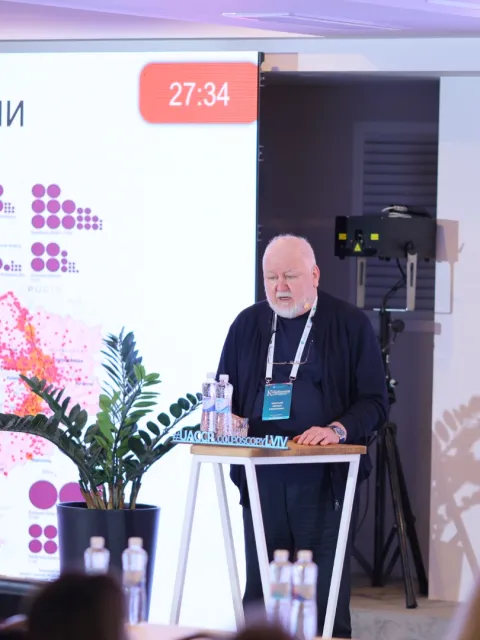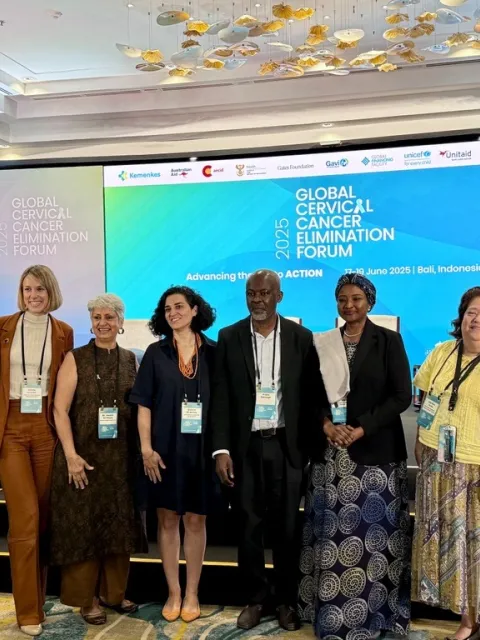Health financing, a key component of the fight against cervical cancer

This 17 November 2022 marks the Cervical Cancer Elimination Day of Action on the second anniversary of the launch of the WHO Global Strategy to Accelerate the Elimination of Cervical Cancer as a Public Health Problem.
The 90-70-90 targets[1] outlined in this strategy are achievable and within the reach of countries if the necessary resources are mobilised and allocated efficiently. Thus, it is not unrealistic to expect a significant decline in the number of new cases of cervical cancer diagnosed each year, in line with the target of 4 cases per 100,000 women.
Mobilising resources is certainly at the core of the fight against cervical cancer. There are funding sources available for organisations working in this space, as well as tools and mechanisms to support them with funding applications, whether it concerns an NGO or a government. As per Cervical Cancer Elimination Day of Action, one small step that can have a big impact is definitely to spread the word.
The Global Fund and cervical cancer control
In its 2023-2028 strategy, the Global Fund has committed to support secondary prevention of cervical cancer by integrating HPV screening and early treatment of precancerous lesions into HIV activities, as part of its strategic objective to end HIV and AIDS and its policy on co-infections and co-morbidities.
Since the first New Funding Model (NFM), an increasing but limited number of countries have applied for and received Global Fund funding for cervical cancer control integration. In NFM3, 21 countries applied for cervical cancer prevention activities with a total projected budget of $8.1 million. The new funding round (NFM4) thus represents an important opportunity for the integration of secondary cervical cancer prevention into HIV services.
L’Initiative, a complementary facility to the Global Fund implemented by Expertise France
Complementary to the Global Fund, L’Initiative is a central mechanism of French international cooperation policy in the fight against pandemics. It was created in 2011 to improve access to Global Fund grants, increase their efficiency and thus strengthen the health impact of the programmes financed. L’Initiative supports national partners in the design, implementation, as well as monitoring and evaluation of Global Fund financing to fight HIV/AIDS, tuberculosis and malaria, and the co-infections and co-morbidities associated with these diseases.
L’Initiative’s work is based on four strategic pillars: mobilising skills, supporting catalytic projects, producing and sharing knowledge, and supporting the influence of French or Francophone actors. These strategic pillars are deployed through three channels:
- The Expertise Channel, which is L’Initiative's technical assistance system. The missions are carried out throughout the year and vary in duration. The aim is to support actors in the fight against pandemics in accessing and implementing Global Fund grants, using a capacity building approach.
- The Projects Channel, which supports medium-term, catalytic programmes to change health practices and policies. L’ Initiative supports the Global Fund and pandemic ecosystem, with a focus on local and national actors.
- In early 2023, a new means of support will be made available: L'Accélérateur. This tool complements L'Initiative's other support for strengthening health systems, including community systems.
Eligible countries can access all three of the above channels to support the expansion or initiation of cervical cancer programmes, particularly among women living with HIV. For example, a request for technical assistance may be made to build the skills of professionals or to build the capacity of an organisation (civil society or national programmes, ministries of health, etc.). Support can also be provided to cervical cancer control activities in applications to the Global Fund.
Cervical cancer control activities, including secondary prevention, are eligible in the Vulnerable Populations and in the Health Systems Strengthening call for proposals, with a view to integrating HIV and cancer control. For example, last year, the third call for proposals on operational research focused on HIV, HPV and related cancers. A total of three projects, to be implemented in Ghana and Cameroon, were selected and will be funded with up to €3.6 million.
Resources and documentation available
L’Initiative has assembled a number of documents and resources in the form of a toolkit. These documents are grouped into four thematic areas:
- Recommendations and advocacy, including various strategic documents to help with preparing updates to national plans and WHO epidemiological data to support these strategies. It also includes documents that can be used for advocacy purposes
- Operationalisation, in which tools are suggested to support assessments of care provision sites, data production, rollout of portable tools
- Sharing learning, which contains success stories on integration and opportunities for sharing between different contexts
- Planning, in which documents are placed to support with national level planning and procurement.
Among the tools and documents available in this toolbox, some have been produced within the framework of the SUCCESS project. This is notably the case for an adapted and simplified version of the C4P costing tool that was initially created for WHO.
A report published in 2021 by the Economist Intelligence Unit exploring the challenges and opportunities of financing cervical cancer control to define a set of priorities for advocacy and engagement of policymakers and financiers is also available. Assessments of the state of health financing for cervical cancer elimination in each of the four project countries – Burkina Faso, Guatemala, Côte d'Ivoire, and the Philippines – conducted by Thinkwell are also featured in this toolkit.
Implemented in Côte d'Ivoire, Burkina Faso, Guatemala and the Philippines, the SUCCESS project – Scale up Cervical Cancer Elimination with Secondary Prevention Strategy – provides an opportunity for countries interested in cervical cancer control to share lessons learned on costing, resource mobilisation and other issues. This sharing is framed by a regional engagement strategy targeting 20 countries. One of the main components of this strategy is the ECHO SUCCESS programme, which is a virtual learning space aimed at fostering and stimulating the exchange of knowledge and practices, with a view to accompanying participating francophone countries in the development and implementation of national strategic plans for cervical cancer control.
_____________________________________________________________________________
[1] 90% of girls fully vaccinated against the human papillomavirus (HPV) by the age of 15, 70% of women screened using a high-performance test by the age of 35 and again by the age of 45, and 90% of women identified with cervical disease receive treatment
[2] Funded by Unitaid, the SUCCESS project is implemented by Expertise France in collaboration with a consortium that already has experience and expertise in cervical cancer prevention and control, Jhpiego and UICC.
Last update
Sunday 15 January 2023Share this page


